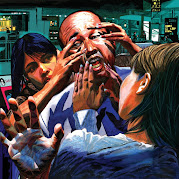When Kim Jong-nam was a boy, his father, the dictator of North Korea, sat him on his office chair and said, “When you grow up, this is where you'll sit and give orders.” If the child had fulfilled that promise—if his half brother, Kim Jong-un, had not ultimately usurped his throne—he would have tyrannized 25 million people.
His pudgy finger would have caressed the launch buttons of nukes. America and China would have debated how to manage him.
But as Jong-nam glanced up at the departures board in the international airport of Kuala Lumpur, Malaysia, the jostling crowd ignored him. He had become just another overweight 45-year-old, the bald spot that he usually hid with a cap showing through his remaining hair like a bull's-eye.
When Kim Jong-nam was a boy, his father, the dictator of North Korea, sat him on his office chair and said, “When you grow up, this is where you'll sit and give orders.” If the child had fulfilled that promise—if his half brother, Kim Jong-un, had not ultimately usurped his throne—he would have tyrannized 25 million people. His pudgy finger would have caressed the launch buttons of nukes. America and China would have debated how to manage him.
But as Jong-nam glanced up at the departures board in the international airport of Kuala Lumpur, Malaysia, the jostling crowd ignored him. He had become just another overweight 45-year-old, the bald spot that he usually hid with a cap showing through his remaining hair like a bull's-eye.
Kim Jong-nam, once the presumptive leader of North Korea.
The Asahi Shimbun
Still, the two beautiful young women destined to kill him picked out their mark.
As Jong-nam sauntered toward the closest AirAsia self-check-in kiosk at 8:59 A.M. on February 13, an Indonesian woman in stylishly torn jeans and a gray sleeveless top slipped out from behind a pillar. She covered his eyes as if playing peekaboo and then wiped her hands over his mouth, leaving an oily smear.
A second later, a Vietnamese woman wearing a white jumper emblazoned with LOL threw her arms over his shoulders and rubbed her hands across his face. She apologized, too, before hurrying in the opposite direction of the Indonesian woman.
Already, the liquid that the women had applied was seeping into Jong-nam, rapidly jamming his muscles' receptors in the “on” position, causing his muscles to constantly contract as if struck by endless cramps. The liquid was VX, a chemical weapon that the CDC calls the “most potent of all nerve agents” and that the United Nations classifies as a weapon of mass destruction. He absorbed a lethal dose, which could have been as small as a drop.
Jong-nam started toward the bathroom—and then lost his only chance to wash off the poison and survive when he rerouted to a nearby information desk. There, he moaned in English, “Very painful, very painful, I was sprayed liquid.” By the time an attendant led him to three policemen, who were chatting rather than monitoring the crowds, he could only groan incoherently as he jabbed at his face with both hands.
A bored-looking officer guided him to the airport medical clinic, but after about three minutes of walking, Jong-nam's knees had stiffened and his feet dragged. The nerve agent was relentlessly stimulating his muscles, and his respiratory system and heart already neared exhaustion.
In the fluorescently lit clinic, he collapsed into a black pleather chair. His indigo T-shirt rode up his belly, and a golden pendant, digitally engraved with a portrait of his wife and son, surfed his heaving chest as he labored to breathe. A seizure rattled him. As his lungs contracted, never relaxing to allow air out, nurses fixed him to an oxygen tank. When he was stretchered to an ambulance, paramedics discerned a faltering heartbeat. But en route to the hospital, it flatlined. He had lasted little more than 15 minutes after the poisoning.
Earlier in his life, Jong-nam often had bodyguards watching his back, but his fall from privilege had been abrupt. He had grown up the firstborn son, with a direct path to ruling North Korea, in a mansion staffed by 100 servants and 500 guards. But after his father, Kim Jong-il, acquired a new mistress who bore two more sons, Jong-nam was dispatched to a posh private school in Geneva. Still, his ascension seemed likely. On his 24th birthday, he was given a general's uniform and soon assigned posts in the secret police and the ruling political party. The state began cultivating the grandeur necessary for him to succeed his father, attributing unbelievable accomplishments to him.


Comments
Post a Comment